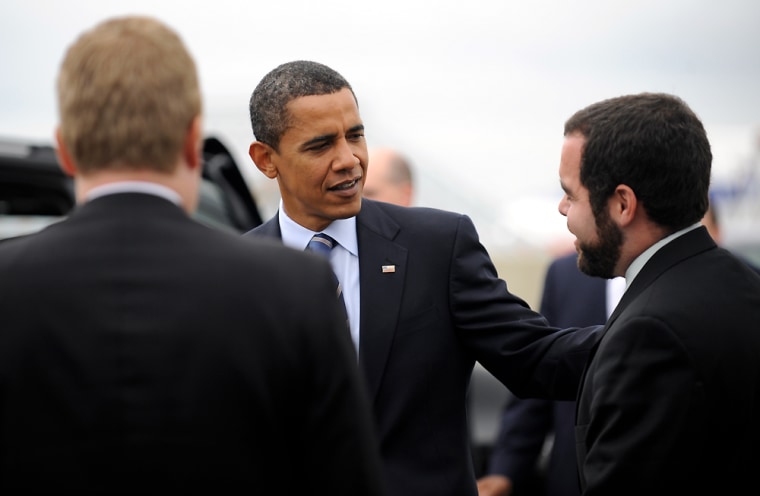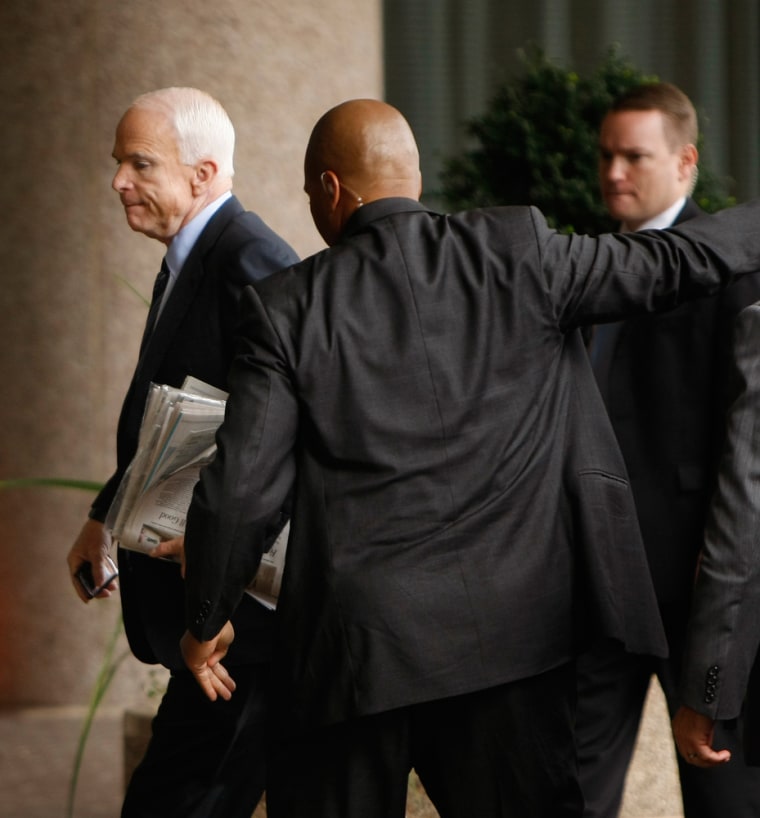Democrat Barack Obama and Republican John McCain on Sunday gingerly embraced a newly negotiated congressional deal for a $700 billion bailout of the hobbled financial industry.
“This is something that all of us will swallow hard and go forward with. The option of doing nothing is simply not an acceptable option,” McCain said. Obama said he was inclined to back it “because I think Main Street is now at stake.”
True to form after a week of posturing, both campaigns sought to take at least partial credit for the outcome. Obama said McCain did not deserve any pats on the back.
“Here are the facts: For two weeks I was on the phone everyday with (Treasury) Secretary (Henry) Paulson and the congressional leaders making sure that the principles that have been ultimately adopted were incorporated in the bill,” Obama said in an interview on “Face the Nation” on CBS.
McCain said the latest version of the plan meets his insistence of an oversight body to monitor the treasury secretary and limits the compensation of executives of financial institutions applying for loans.
“Let’s get this deal done, signed by the president, and get moving, because the real effect of this is going to restore some confidence, and get some credit out there, and get the economic system moving again, which is basically in gridlock today,” McCain told “This Week” on ABC.
The measure would allow the government to buy defaulted mortgages and other distressed housing-related assets, many of them held by Wall Street banks, in an effort to keep the worst financial crisis since the Great Depression from spreading throughout the entire economy.
Obama predicted quick passage of the measure, which he said contained important consumer-friendly provisions he had supported. “Today, thanks to the hard work of Democrats and Republicans, it looks like we have a rescue plan that includes these taxpayer protections,” Obama said in remarks prepared for a Detroit rally. “And it looks like we will pass that plan very soon.”

McCain made a show on Wednesday of “suspending” his campaign to return to Washington to help negotiate terms of a bailout agreement. He initially suggested that Friday’s presidential debate be postponed if no deal was struck. But his campaign ads continued to air and McCain attended the debate even though there was no deal.
While McCain is not on a Senate committee involved with the financial crisis, he said Sunday he rushed back to Washington because he was not going to “phone in” his advice.
“I’m a Teddy Roosevelt Republican. I’ve got to get in the arena when America needs it,” McCain said.
Republicans generally have said his participation helped prod the agreement. Democrats countered that his presence had little effect on the outcome and may have even delayed a deal.
“Whether I helped or hurt, I’ll be glad to accept the judgment of history,” McCain said.
McCain said he planned to return to full-time campaigning Monday.
He also said he probably would have voted for legislation to keep the government running even though it contained thousands of the type of pork barrel projects he strongly opposes.
The $634 billion measure passed the Senate on Saturday. It also includes $25 billion in taxpayer-subsidized loans for automakers.
Like McCain, Obama spent parts of several days in Washington because of the bailout talks. But he has returned to the trail and on Sunday he and running mate Joe Biden planned to attend a rally in Detroit, the home of the nation’s auto industry. Michigan is a key battleground in the November.
Obama said in his television interview that he was inclined to support the bailout because it includes increased oversight, relief for homeowners facing foreclosure and limits on executive compensation for chief executives of firms that receive government help.
“None of those were in the president’s provisions. They are identical to the things I called for the day that Secretary Paulson released his package,” Obama said. “That I think is an indication of the degree to which when it comes to protecting taxpayers, I was pushing very hard and involved in shaping those provisions.”
The safeguards were supported by many in Congress, including Democrats and Republicans.
Congressional leaders continued to work through the weekend on the bailout package and hoped to have a vote on the measure Monday in the House, with a vote in the Senate coming later.
The Republican vice presidential candidate, Alaska Gov. Sarah Palin, credited McCain with helping to ensure that the bailout plan protected taxpayers. Reporters were kept at a distance when she made a campaign stop in Philadelphia, although Palin took one question about the $700 bailout agreement.
“I’m thankful that John McCain is able to have some of those provisions implemented in that Paulson proposal,” she said. “I’m glad that John McCain’s voice was heard.”
